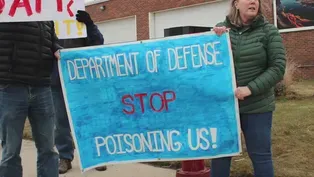
The future of #MeToo as Donald Trump returns to power
Clip: 11/24/2024 | 6m 44sVideo has Closed Captions
The future of #MeToo as a second Trump administration prepares to take power
There’s a noticeable pattern across some of President-elect Trump’s Cabinet nominees: allegations of sexual misconduct or assault. Trump himself has been publicly accused of sexual misconduct and found liable in civil court of sexual abuse, and his return to office is raising questions about the future of the #MeToo movement. Law professor Deborah Tuerkheimer joins Laura Barrón-López to discuss.
Problems with Closed Captions? Closed Captioning Feedback
Problems with Closed Captions? Closed Captioning Feedback
Major corporate funding for the PBS News Hour is provided by BDO, BNSF, Consumer Cellular, American Cruise Lines, and Raymond James. Funding for the PBS NewsHour Weekend is provided by...

The future of #MeToo as Donald Trump returns to power
Clip: 11/24/2024 | 6m 44sVideo has Closed Captions
There’s a noticeable pattern across some of President-elect Trump’s Cabinet nominees: allegations of sexual misconduct or assault. Trump himself has been publicly accused of sexual misconduct and found liable in civil court of sexual abuse, and his return to office is raising questions about the future of the #MeToo movement. Law professor Deborah Tuerkheimer joins Laura Barrón-López to discuss.
Problems with Closed Captions? Closed Captioning Feedback
How to Watch PBS News Hour
PBS News Hour is available to stream on pbs.org and the free PBS App, available on iPhone, Apple TV, Android TV, Android smartphones, Amazon Fire TV, Amazon Fire Tablet, Roku, Samsung Smart TV, and Vizio.
Providing Support for PBS.org
Learn Moreabout PBS online sponsorshipLaura Barrón-López: President elect Donald Trump has finished naming his top cabinet nominees, and there's a noticeable pattern across some of them, allegations of sexual misconduct or assault.
First, there's Trump's failed pick for attorney general, Matt Gaetz.
A woman testified to House investigators that when she was a 17-year-old minor, she had sex with Gaetz at a party.
Two other women testified that Gaetz paid them for sex multiple times.
Gaetz has denied the allegations.
He withdrew his nomination last week, unable to secure enough support as more details surface.
But he's not alone.
Trump's picked to lead the Defense Department Pete Hegseth is accused of sexually assaulting a woman in 2017 in a California hotel room.
According to a police report released last week, the woman said Hegseth took her phone and blocked her exit.
It was first reported to police by a nurse after a patient requested a sexual assault exam.
Hegseth settled with the woman last year, but denies any wrongdoing.
There's also Robert F. Kennedy Jr., Trump's nominee to be Secretary of Health and Human Services.
He's accused on multiple occasions of groping a 23-year-old woman who once worked for him as a live in nanny.
And Donald Trump himself has been publicly accused of sexual misconduct by two dozen women, including forcibly reaching under their skirts and kissing them without consent.
Last year, he was found liable in civil court of sexual abuse and defamation.
Despite these sexual misconduct allegations, Trump will soon be in the Oval Office.
And if confirmed, his nominees will be in top jobs across government, raising questions about the future of the MeToo movement.
Deborah Tuerkheimer is a law professor at Northwestern University and the author of "Credible: Why We Doubt Accusers and Protect Abusers."
She joins me now.
Deborah, thanks for joining.
When the MeToo movement swept the country around 2017, it brought down giants of Hollywood, Silicon Valley media, you name it.
And it appeared to have changed society's expectations when it came to addressing sexual abuse or assault.
But now we're seeing a second Trump administration being staffed with people accused of sexual misconduct.
What signal does it send that these people may be filling some of the highest positions in government and leading the military or determining health policy?
Deborah Tuerkheimer, Author, "Credible: Why We Doubt Accusers and Protect Abusers": Well, it sends a powerful signal that the work of the MeToo movement is woefully incomplete, that there's a lot of work left to be done.
The movement made a lot of progress.
It surfaced the commonality of abuse.
It got us talking about abuse.
And for several high profile men, there was accountability.
But the structures of power that MeToo was taking aim at are still very much in place.
And we've seen that, I think with particular intensity in the last few weeks with the election of Donald Trump and then his selection of these men to fill his Cabinet.
Laura Barrón-López: Some Republican senators have called the allegations against Pete Hegseth the nominee for the Defense Department.
They have called those allegations concerning.
But the majority of Republicans have either been quiet or have dismissed those allegations as media reports.
Why the insistence on confirming these picks, and why not choose other nominees?
Deborah Tuerkheimer: Well, I think what's going on at some deeper level is a contest between competing worldviews around male sexual entitlement.
And Donald Trump has been very clear.
We can think back to the release of the Access Hollywood tape and to his boast that he could do anything to the finding of civil liability.
And Donald Trump is elected.
The public, at least the public that elected him, did not feel that any of this was important enough to be disqualifying.
And he clearly feels enabled and emboldened to select individuals who face their own credible allegations.
Really by way of reinforcing the idea that men in power have a range of entitlements, including sexual entitlements, and that there will be no impunity for this kind of abuse.
Laura Barrón-López: What does the current political situation say about how the MeToo movement is viewed right now?
Is this a setback?
Are the changes that movement ushered in jeopardy at all?
Deborah Tuerkheimer: Well, I think that the movement has been facing a backlash for some time, and we've seen various indications of that.
Certainly the election of Donald Trump is another indication of some backlash, but the movement, it will move forward.
I think that the movement came about in part because of Donald Trump's on that Access Hollywood tape and then his subsequent election, and a sense on the part of so many survivors that it was time to end the impunity that men who abuse have enjoyed for so long.
So this is a long pendulum swinging back and forth that we're seeing, and there's no reason to believe that this is where the pendulum stops swinging.
Laura Barrón-López: It's not just Donald Trump, Pete Higseth or RFK Jr. Two other people Trump has named to his administration are facing allegations.
Elon Musk and SpaceX were sued by former employees for creating a workplace that they said treated women as sexual objects.
And then Linda McMahon, the nominee for Secretary of Education, is facing allegations of covering up sexual abuse toward children from her time at the WWE.
So what does this say about how those in power handle allegations and abuse and how they may run the departments that they're being nominated for?
Deborah Tuerkheimer: Well, the amount of abuse that goes on in our society goes on because there are structures that tolerate it.
And so the examples that you cite are illustrations of this.
And it is absolutely a powerful and frankly, devastating message to survivors and those who care about them when individuals are heading departments that are charged with ferreting out just this kind of abuse.
And those individuals have themselves run afoul of these rules and norms that the MeToo movement is trying to promote and trying to reinforce.
Laura Barrón-López: Deborah Tuerkheimer, thank you for your time.
Deborah Tuerkheimer: Thank you.
How toxic water in Michigan is affecting military veterans
Video has Closed Captions
How toxic water in northern Michigan is affecting military veterans and their families (8m 40s)
Why millions of adults with ADHD struggle to get treatment
Video has Closed Captions
Why millions of adults with ADHD struggle to get treatment (5m 52s)
Providing Support for PBS.org
Learn Moreabout PBS online sponsorshipSupport for PBS provided by:
Major corporate funding for the PBS News Hour is provided by BDO, BNSF, Consumer Cellular, American Cruise Lines, and Raymond James. Funding for the PBS NewsHour Weekend is provided by...













